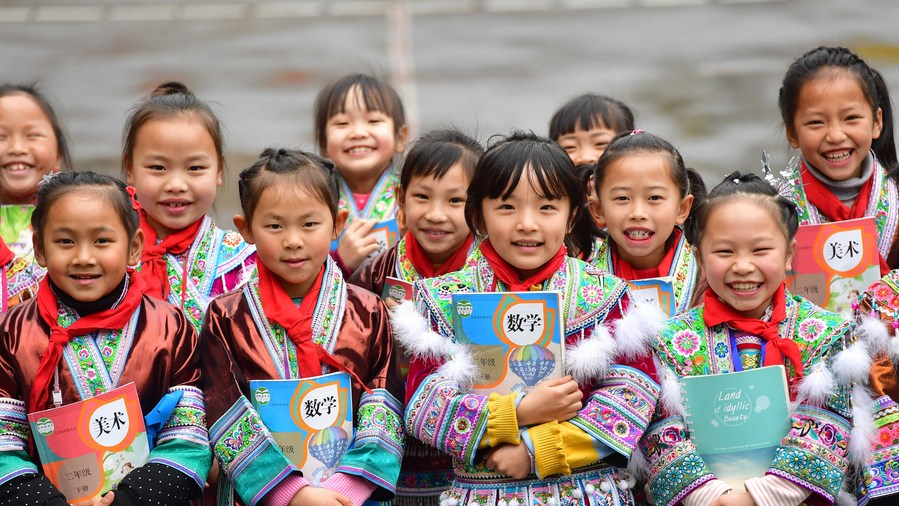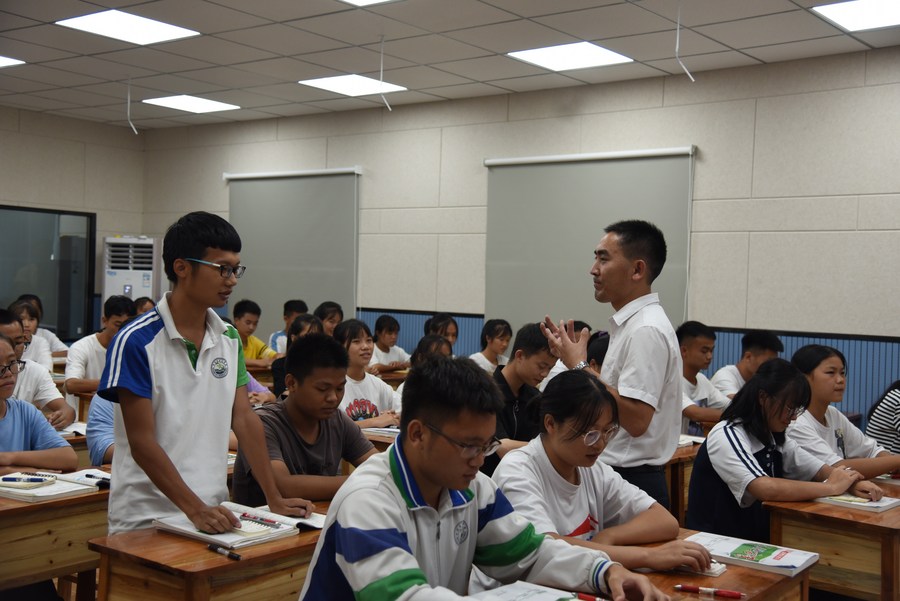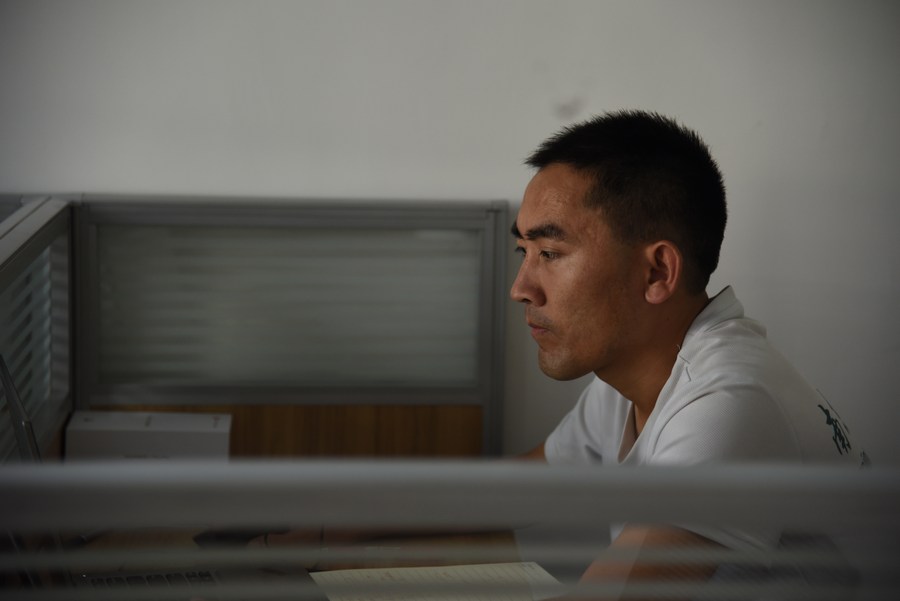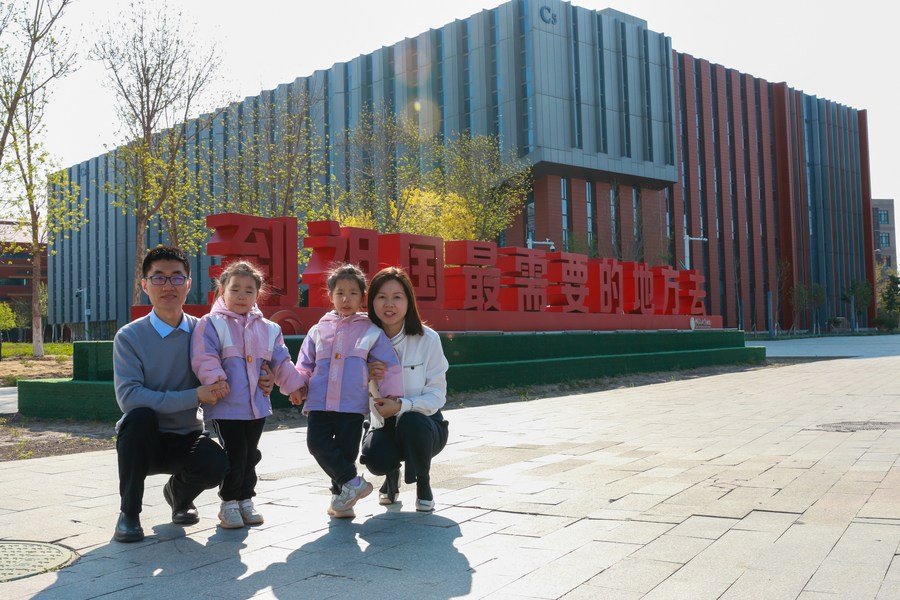China's achievement in poverty alleviation is not just limited to improvements in material conditions. It also includes efforts to raise the public spirit. The country has boosted the enthusiasm, ambition and creativity of the poor by providing them with access to education and helping to build aspirations among their youth.
Teachers in the rural education front line adhere to the original intention to improve the country's strength in education, promote the all-round development of talents, and contribute to national revitalization and social progress.
Passing from generation to generation, education for these teachers is more like a relay race.

Students pose for a photo at a primary school in the Gandong Township of the Rongshui Miao Autonomous County, south China's Guangxi Zhuang Autonomous Region, March 14, 2019. /Xinhua
Students pose for a photo at a primary school in the Gandong Township of the Rongshui Miao Autonomous County, south China's Guangxi Zhuang Autonomous Region, March 14, 2019. /Xinhua
A 'golden period of development'
Liu Xiuxiang, the vice headmaster at the Experimental High School in Wangmo County in Southwest China's Guizhou Province, was a delegate to the 20th Communist Party of China (CPC) National Congress, representing his hometown, Guizhou.
"In 2012, only 70 people in our county were admitted to universities. In 2022, more than 1,300 people have been admitted to universities, and each village has at least one college student," Liu told media during the 20th CPC National Congress in Beijing in October.

Liu Xiuxiang talks with students during a class meeting at the Experimental High School in Wangmo County in southwest China's Guizhou Province, September 7, 2020. /Xinhua
Liu Xiuxiang talks with students during a class meeting at the Experimental High School in Wangmo County in southwest China's Guizhou Province, September 7, 2020. /Xinhua
Seeing developing education as its key strategy, Wangmo County gathered education resources and provided children with some of the best teachers and schools for primary and junior high education.
Over the last decade, rural education has undergone tremendous changes. For China, one of the priority missions is "to incorporate improving educational equality into all aspects and links of deepening comprehensive reform in education, narrow the gaps in education between urban and rural areas, between regions, strive to ensure every child's access to fair and quality education, and meet the people's needs for good education.”
In 2012, China's State Council published a document for the development of Guizhou, which was home to many impoverished mountainous regions. The province saw vast improvements afterward, as infrastructure has been greatly improved to link every county, with every area having effectively shaken off extreme poverty.

Liu Xiuxiang sorts student profiles during a class meeting at the Experimental High School in Wangmo County in southwest China's Guizhou Province, September 8, 2020. /Xinhua
Liu Xiuxiang sorts student profiles during a class meeting at the Experimental High School in Wangmo County in southwest China's Guizhou Province, September 8, 2020. /Xinhua
In November 2020, China achieved the feat of removing all remaining counties from the country's poverty list after an announcement that the last nine impoverished counties – all in Guizhou Province – had eliminated absolute poverty.
The local governments in Guizhou have also increased their investment in education. The provincial finance department has allocated nearly 15 million yuan (about $2 million) for student aid and subsidies in many counties in Guizhou this year to promote the balanced development of education in urban and rural areas.
"The last decade was a 'golden period of development' for Guizhou," Liu said. "There will be more to look forward to."
A relay race
Sun Lei, a Beijing Foreign Studies University professor, is in her fourth year in an educational assistance program in northwest China's Xinjiang Uygur Autonomous Region.
Sun works at the China University of Petroleum, Beijing at Karamay (CPUBK). Her responsibilities include developing the school's Russian language major, advancing its philosophy and social science disciplines, and assisting in establishing a research institute.
"What talents Xinjiang needs, we nurture them," said Sun, who signed up for the program to support Xinjiang's educational cause in 2019.

Sun Lei (1st R), her husband and two children pose for a photo at the China University of Petroleum, Beijing at Karamay (CPUBK) in Karamay, northwest China's Xinjiang Uygur Autonomous Region, September 21, 2023. /Xinhua
Sun Lei (1st R), her husband and two children pose for a photo at the China University of Petroleum, Beijing at Karamay (CPUBK) in Karamay, northwest China's Xinjiang Uygur Autonomous Region, September 21, 2023. /Xinhua
"There is still much work to be done here. I can't leave, and I don't want to leave," Sun said.
China has been implementing "pairing assistance" programs in Xinjiang since 1997. Over the past decade, more than 130 high-level universities from provincial-level regions have invested 27.1 billion yuan to improve education in Xinjiang.
In 2015, the CPUBK inauguration ceremony was held in Urumqi. For this newly established campus to grow quickly, 14 universities, including Beijing Foreign Studies University, Beijing Jiaotong University and Central University of Finance and Economics, have sent teachers to support the development of the campus.
It takes nearly four and a half hours by plane from the sparsely populated Karamay desert to the bustling capital, Beijing, flying over 3,500 kilometers. Over the years, tens of thousands of outstanding teachers, like Sun, have volunteered to assist in boosting educational development in Xinjiang.
Since 2022, to better implement the rural revitalization strategy, the Ministry of Education in China dispatched over 2,000 principals and teachers to schools in poor western counties. The principals were urged to seek solutions adapted to local conditions and enhance both school facilities and educational quality to give every child a chance at success in life.
(With input from Xinhua)